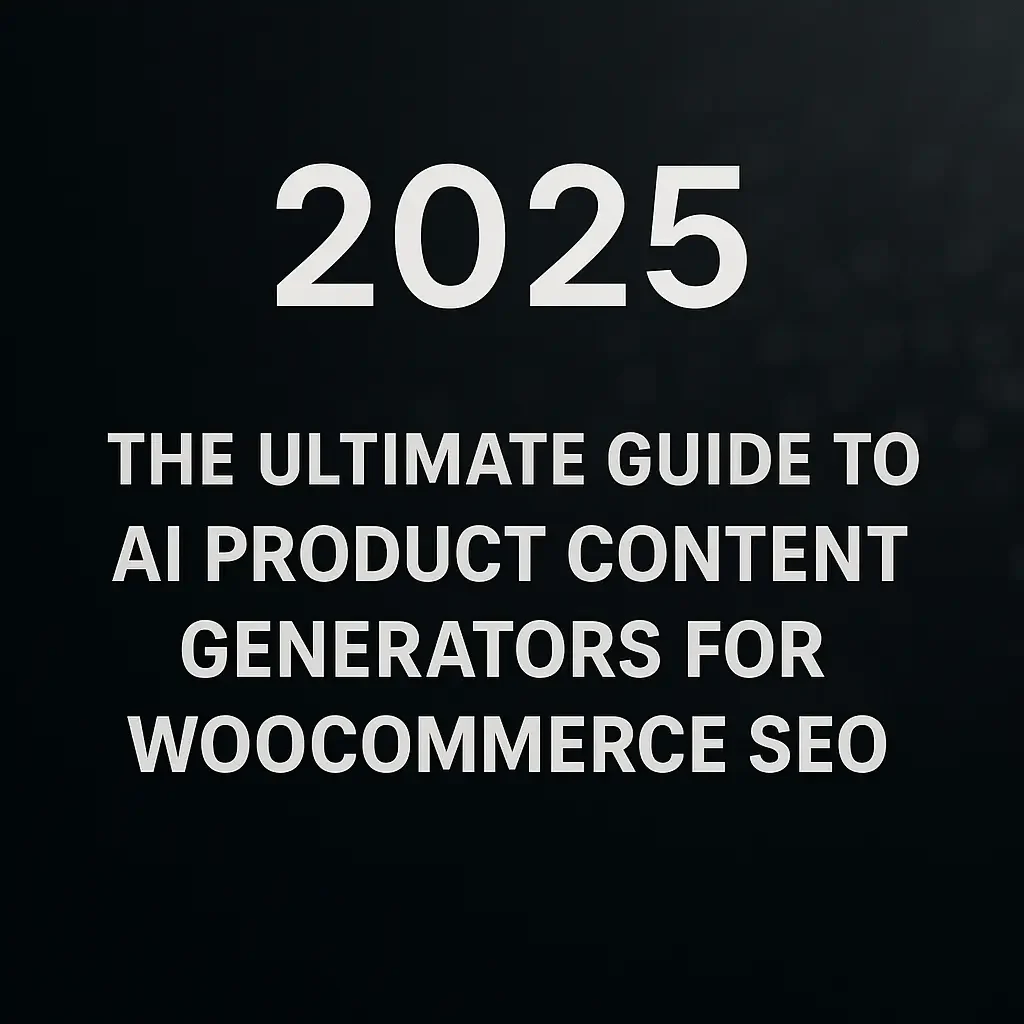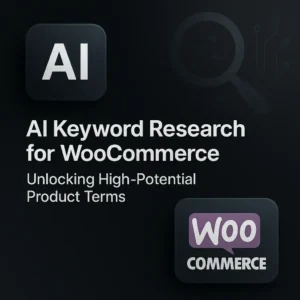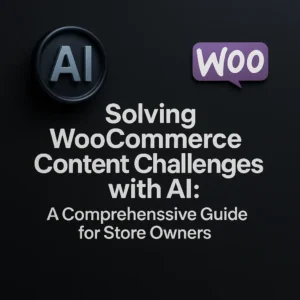What is an AI Product Content Generator and Why WooCommerce Needs It?
An AI Product Content Generator is a sophisticated software application that leverages artificial intelligence and natural language processing (NLP) to automate the creation of various forms of product-related content. This encompasses, but is not limited to, crafting compelling product descriptions, generating attention-grabbing titles, and even identifying relevant tags and keywords. Unlike basic text generators, these advanced tools are designed to understand context, analyze user intent, and adhere to established SEO best practices, ensuring that the generated content is not only coherent but also strategically optimized for search engines.
WooCommerce store owners, particularly those managing extensive or rapidly expanding inventories, face a significant challenge: the manual process of writing unique and optimized content for each product is incredibly time-consuming, repetitive, and prone to inconsistencies. AI product content generators directly address this by automating what is often considered the “grunt work” of content creation. These tools efficiently handle tasks ranging from suggesting high-potential keywords to generating full product descriptions in mere seconds, freeing up valuable time for strategic business activities.
Beyond mere automation, AI significantly enhances SEO efficiency. Traditional keyword research tools often rely on static databases and metrics, which can quickly become outdated. In contrast, AI keyword generators adapt in real-time, leveraging machine learning to detect emerging trends, analyze complex search intent, and identify semantic relationships between terms. This dynamic capability leads to more precise, data-backed insights and the discovery of profitable long-tail keywords that might otherwise be overlooked, providing a substantial competitive advantage for WooCommerce stores in a crowded online marketplace.
AI is also uniquely positioned to help overcome common WooCommerce issues such as duplicate content. This problem frequently plagues e-commerce sites with similar products or numerous variations, where identical or near-identical content can confuse search engines and harm rankings. By generating unique content for each listing, AI helps mitigate potential penalties and improve search visibility. It directly addresses the scalability challenges associated with efficiently managing and updating thousands of product listings, ensuring that even large catalogs can maintain high content quality and uniqueness.
Google’s increasing emphasis on “content created for people” and its E-E-A-T (Experience, Expertise, Authoritativeness, Trustworthiness) framework means that generic, manufacturer-copied content—a widespread issue in WooCommerce stores —is increasingly being deprioritized or ignored by search engines. AI, when appropriately guided and refined, possesses the capability to generate unique, high-quality, and valuable content that aligns with these evolving standards. This means AI product content generators are no longer just tools for efficiency; they are becoming essential for WooCommerce stores to meet Google’s higher content quality benchmarks and maintain visibility in an increasingly competitive and AI-driven search engine results page (SERP) landscape. This strategic alignment helps businesses avoid the pitfall of producing “generic AI fluff” and instead deliver genuinely helpful and authoritative content.
Beyond Keywords: How AI Transforms Your Entire Content Workflow
The utility of AI in content creation extends far beyond simple keyword generation, fundamentally transforming the entire content workflow for e-commerce businesses.
Keyword Generation: AI keyword generators, such as SEO.com’s free tool or those integrated into comprehensive platforms , can rapidly provide optimized keyword suggestions, uncover long-tail phrases, and adapt to the latest search engine updates. These tools analyze vast search patterns and data to generate highly relevant keyword lists, significantly improving search visibility. For optimal results, when utilizing AI for keyword research, it is crucial to specify the content format (e.g., blog post, product page, PPC ad copy), define the target audience and their intent, and request variations. This focused approach ensures the generated suggestions are highly refined and directly applicable to specific marketing and sales objectives.
Description and Title Generation: AI tools are exceptionally adept at generating compelling, SEO-friendly product descriptions and titles in mere seconds. They achieve this by analyzing key product details, features, benefits, and target audience insights to craft content that resonates with potential customers. Furthermore, these tools can ensure a consistent tone and style across all listings, reinforcing brand identity and providing a cohesive customer experience.
Bulk Content Creation: A paramount advantage for WooCommerce store owners is the ability to generate content in bulk. Plugins like “AI Product Tools” facilitate the mass creation of titles, descriptions, and tags, leveraging powerful AI models such as ChatGPT and Gemini. Tools like WP Sheet Editor – AI enable efficient bulk generation directly within spreadsheet cells or via dedicated bulk edit interfaces, utilizing global prompts and integrating custom product fields, vastly accelerating the content creation process for large inventories.
Customization and Personalization: Advanced AI content tools offer robust custom field integration, allowing users to map existing WooCommerce product data (e.g., material, size, color, brand) as AI variables within their prompts. This capability ensures the generation of ultra-targeted content that is highly unique and relevant to specific product attributes, moving beyond generic templates.
The advent of AI tools, with their bulk generation and custom field integration capabilities , signifies a fundamental paradigm shift in content workflow. Historically, content creation for e-commerce, particularly for product descriptions and titles, has been a labor-intensive, product-by-product endeavor. This technological advancement transforms the role of the WooCommerce store owner or content manager. Instead of being primarily manual writers, they evolve into strategic content managers and optimizers. Their focus shifts to guiding the AI with precise prompts and data, and then critically refining the generated output. This implies a growing need for new skill sets, such as prompt engineering, data mapping, and critical content review, necessitating a re-evaluation of traditional content team roles. This evolution allows businesses to scale their content efforts in ways previously unimaginable, directly supporting growth objectives.
Choosing the Right AI Content Tool for Your WooCommerce Store
Selecting the appropriate AI content generation tool is crucial for maximizing its benefits within a WooCommerce environment. Several key features should guide this decision:
Key Features to Consider:
- WooCommerce Integration: Prioritize plugins or platforms explicitly designed for or offering strong, seamless integrations with WooCommerce. This enables direct content generation within the store’s backend, minimizing friction and streamlining workflows.
- Bulk Generation Capabilities: This is essential for any WooCommerce store with a significant inventory. The ability to generate descriptions, titles, and tags for hundreds or thousands of products at once is a game-changer for efficiency and scalability.
- Customization & Flexibility: Look for tools that allow for granular control over content generation. This includes selecting tone and style, choosing generation modes (e.g., creative, balanced, conservative), targeting specific keywords, and, crucially, integrating custom fields for highly personalized content that reflects unique product attributes.
- Inherent SEO Optimization Features: The most effective tools will naturally incorporate SEO best practices. This includes intelligent keyword optimization, adherence to character limits for titles and meta descriptions, and built-in mechanisms to prevent keyword stuffing, which can harm search rankings.
- Human Oversight & Review Functionality: Since AI is not infallible, features like “edit-before-approve” functionality or generation history are critical. These allow for necessary human review to ensure accuracy, quality, and alignment with brand guidelines and factual information.
- Versatility: While some AI plugins are designed to address a single, specific issue, potentially requiring the installation of multiple plugins , consider tools that offer a broader suite of content generation features or a centralized “AI WooCommerce Toolkit Dashboard” for streamlined control and management of various AI-powered tasks.
Examples of Relevant Tools:
- AI Product Tools WooCommerce plugin (WordPress plugin): This powerful WooCommerce plugin offers robust bulk generation for titles, descriptions, and tags. It features OpenRouter integration for access to diverse AI models (including free options), supports custom fields integration, and provides a dual-generator system for varied content needs. Users have praised it for its ease of use and efficient bulk change capabilities.
- WP Sheet Editor – AI: This tool allows users to generate and bulk edit product descriptions and SEO titles/descriptions directly within spreadsheet interfaces, leveraging global prompts and custom product fields for efficient content management.
- Other Noteworthy AI Tools: Copy.ai is useful for keyword generation and content prompts. SEO.com offers a free AI keyword generator. SEO.ai provides both an AI keyword tool and a product description generator. ShipBuddies offers dedicated product description and title generators. Quattr features an AI title generator. Additionally, MarketMuse and Frase.io are highlighted for their capabilities in content strategy and generation.
The user query specifically targets WooCommerce users. While a plethora of general AI content generation tools exist , the research highlights the significant advantages of plugins like “AI Product Tools” and “WP Sheet Editor – AI”. These tools are designed to integrate directly with WooCommerce’s unique data structures, such as custom fields and product attributes. The observation here is that for optimal efficiency, accuracy, and seamless workflow integration, WooCommerce users should prioritize AI solutions that inherently understand and leverage their existing product data and operate within their WordPress/WooCommerce environment. Relying solely on external, general-purpose AI writers, while possible, may introduce unnecessary complexities and limit the full potential of automation and customization specific to an e-commerce catalog. This direct integration streamlines the entire content pipeline, from generation to publication, within the familiar WooCommerce ecosystem.
Integrating AI for Seamless Content Creation: A Step-by-Step Approach
Integrating AI into your WooCommerce content workflow requires a structured approach to ensure optimal results and avoid common pitfalls.
- Understand Your Product & Audience: Before engaging any AI generator, cultivate a crystal-clear understanding of your product’s features, core benefits, unique selling points (USPs), and, critically, your target audience. This foundational clarity is paramount for providing precise and effective input to the AI, ensuring the generated output is relevant and compelling.
- Input Key Product Details: Provide the AI with essential information such as the product name, key features (it is often recommended to limit these to 4-5 for descriptions to maintain focus), specifications, and a concise description of your target audience. For titles, ensure you include relevant keywords and highlight critical features like size, color, or material to maximize their impact.
- Leverage Custom Fields & Attributes: A powerful technique is to map your existing WooCommerce custom fields (e.g.,
material,brand,dimensions) as variables within your AI prompts. This enables the AI to dynamically pull specific data for ultra-targeted and highly unique content generation, ensuring accuracy and relevance that generic inputs cannot provide. - Define Tone & Style: Select the desired writing style or tone (e.g., professional, conversational, persuasive, urgent, luxury) that best aligns with your brand voice and resonates with your target audience. This consistency reinforces brand identity and builds customer trust.
- Generate & Rigorously Review: Initiate the content generation process and then critically review the AI-produced content. It is vital to remember that AI is not flawless; always fact-check for accuracy, ensure coherence, and verify that the content aligns perfectly with your brand messaging and SEO objectives. Utilize features like “edit-before-approve” where available to facilitate this crucial human oversight.
- Optimize for SEO & Uniqueness: Naturally integrate relevant keywords throughout the content, avoiding keyword stuffing, which can harm rankings and user experience. Emphasize the benefits of the product over a mere listing of features, explaining how it solves a problem or improves a customer’s life. Crucially, ensure the generated content is unique to circumvent duplicate content penalties, especially if previous content relied on manufacturer descriptions.
- Implement Bulk Operations & Automation: For managing large inventories, leverage bulk generation features. Many tools allow you to apply global prompts or rulesets to hundreds or even thousands of products simultaneously, vastly improving efficiency and maintaining consistency across your catalog. Consider setting up consistent rulesets for ongoing bulk updates to streamline future content modifications.
While AI undeniably offers unprecedented speed and automation in content generation , a recurring theme across the available information is the critical need for human oversight. Statements such as “AI isn’t flawless” , the directive to “fact-check thoroughly” , the warning “don’t publish unreviewed content” , and the recommendation for “human review and editing” all underscore this point. The implication is that AI serves as a powerful tool, but it is not a replacement for human expertise, judgment, and creativity. For WooCommerce content to be genuinely helpful, unique, and to avoid the dreaded “generic AI fluff,” a “human-in-the-loop” approach is not merely an option but an imperative. This human intervention ensures factual accuracy, maintains brand voice integrity, injects unique insights, and, most importantly, helps the content adhere to the crucial E-E-A-T principles, which Google increasingly prioritizes.
FAQs: Addressing Common Concerns About AI-Generated Content
Q: Will AI-generated content be original and rank well in search engines? A: Yes, AI can generate original content, particularly when provided with detailed, unique inputs and, if possible, fine-tuned with specific brand data. However, generic AI models are prone to producing duplicate texts if not properly guided or data-driven. To rank effectively, the content must be genuinely unique, provide substantial value to the user, focus on clear user intent, and strictly adhere to Google’s E-E-A-T principles (Experience, Expertise, Authoritativeness, Trustworthiness). Human review remains critical to ensure both uniqueness and overall quality of the output.
Q: Will AI-generated content contain errors or “hallucinations”? A: AI models are known to occasionally produce inaccurate, nonsensical, or “hallucinated” information. This inherent characteristic is precisely why thorough fact-checking and diligent human oversight are non-negotiable steps in the content creation workflow. Advanced AI techniques, such as Reinforcement Learning from Human Feedback (RLHF), REACT prompting, and Retrieval Augmented Generation (RAG), are being developed and implemented to mitigate these issues, but human vigilance remains paramount.
Q: Is AI content generation suitable for all product types in a WooCommerce store? A: Absolutely. AI product content generators are highly scalable and capable of creating descriptions for an extensive range of products, spanning from electronics and apparel to software and professional services. The key to success lies in providing clear, detailed input and effectively leveraging custom product fields to inform the AI about specific attributes and nuances of each product.
Q: How does AI specifically help with SEO for WooCommerce? A: AI significantly enhances WooCommerce SEO by generating keyword-optimized content that aligns with search intent, thereby improving visibility. It plays a crucial role in helping stores avoid duplicate content penalties, a common issue in e-commerce. While not directly impacting site speed, AI indirectly contributes to improved site loading speed by streamlining content processes, which can reduce the need for heavy, unoptimized manual content. Furthermore, AI enhances user experience through clear, engaging, and consistent content, which can reduce bounce rates and improve overall site engagement. AI tools are also adept at identifying profitable long-tail keywords and adapting content to evolving search trends, providing a competitive edge.
Q: How can content generated by AI avoid being perceived as “generic AI fluff”? A: To avoid generic “AI fluff,” a content strategy must prioritize quality and provide unique and substantial value. This involves guiding the AI with highly specific prompts, leveraging custom product data, and defining a distinct brand voice and tone. Crucially, human expertise and experience must be integrated into the process. This means fact-checking, refining, and adding unique insights, personal stories, or case studies that AI alone cannot generate. The goal is to use AI as a powerful assistant, not a complete replacement, ensuring the final content is informative, helpful, and resonates authentically with the target audience.




